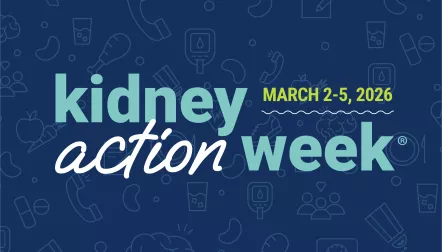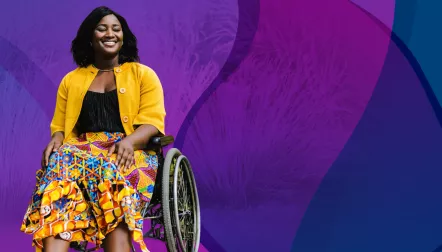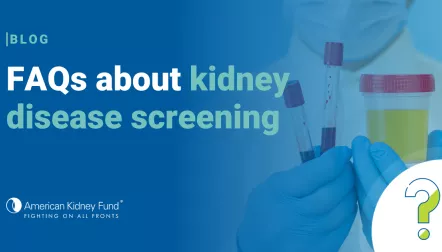
Blog post
4 things you should understand about living with kidney disease

A simple question — "What do you wish others understood about living with kidney disease?" — unleashed a torrent of comments on our Facebook page recently. Kidney disease itself is often invisible until the late stages; once it progresses to kidney failure, you will need dialysis or a transplant to live. People living with kidney disease and kidney failure tell us they often feel that others do not understand what they are going through, both physically and emotionally.
Several common themes emerged on our Facebook page. Here are the four things people living with kidney disease most wish others would understand.
1. It is exhausting
There is a special kind of tired that often accompanies kidney disease, and it is not always predictable. "I have my good days and my bad," notes Emily. "Some days I want to sleep and most I'm ready to go." For many, the fatigue is pervasive. "I'm not lazy," says Linda. "My energy level is like someone at the end of a full day of work when I wake up." Valerie writes, "I'm always tired! And I think my family and friends get tired of hearing that." Some people compare it to the flu: "It's like feeling flu like tired all the time and not thinking clearly because you're so tired," says Lori. Emily sums up what people with kidney disease want: "Most of all, all we want is understanding, patience and acceptance."
2. Looks can be deceiving
Kidney disease does not have outward physical symptoms, so friends, coworkers and even family members may have a hard time understanding just how poorly people with kidney disease often feel. "Just because I look OK doesn't mean I feel OK," writes Natalie. "Every day I have to get up and try to be normal, try to be a good mom, try to be a good friend, try to be a good employee, try to be a good wife." Mary Ann concurs: "Just because we may look the same, we don't feel the same and cannot function the same way." Many people living with kidney disease make keeping up with their appearance a priority: "I always try to put on a 'normal' and 'healthy' appearance when I leave the house," writes Jill. "I hope they understand the strength it takes to do that."
3. The pain is real
The pain that often accompanies kidney disease and dialysis treatments can make it difficult to do many things other people take for granted. "The pain never stops," writes Heather Marie. "Even picking my kids up to hold them hurts and no one could understand that type of pain." Delores notes: "Even the smallest simplest things are hard to do, not to mention the pain and fatigue, especially the day after dialysis. And dialysis is painful. You are not just sitting there for three to four hours enjoying yourself with two big needles stuck in your arm." Michelle offers this advice: "Be supportive and know we deal with some type of pain daily, sometimes extreme."
4. There is no cure
Once your kidneys have failed, the only treatments are dialysis or transplant. "Dialysis is not a cure," writes Kevin. "It is, for all intents and purposes, a life sustaining treatment. And that is all." JeJe says, "Not even a transplant will make you healthy. Your life is just sustained with drugs and drastic treatments."
Despite these obstacles, many people with kidney disease tell us they work hard to maintain a positive outlook and live their lives to the fullest. And they want others to avoid experiencing what they are. "A LOT of people with kidney disease don't even know they have it," writes Roselie. "Get tested!"






